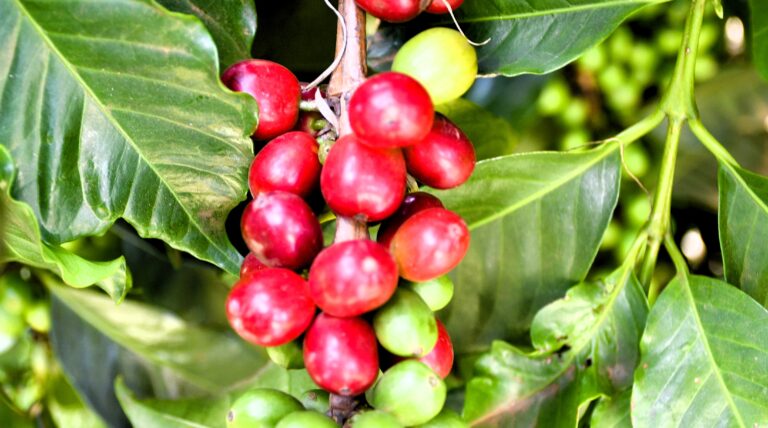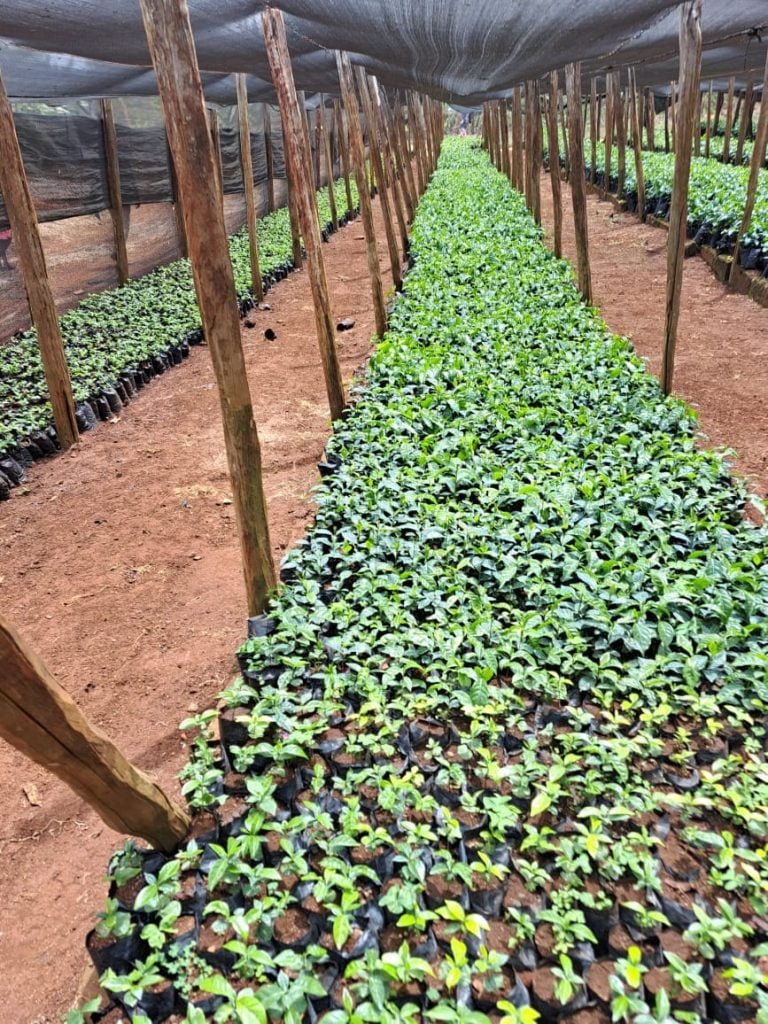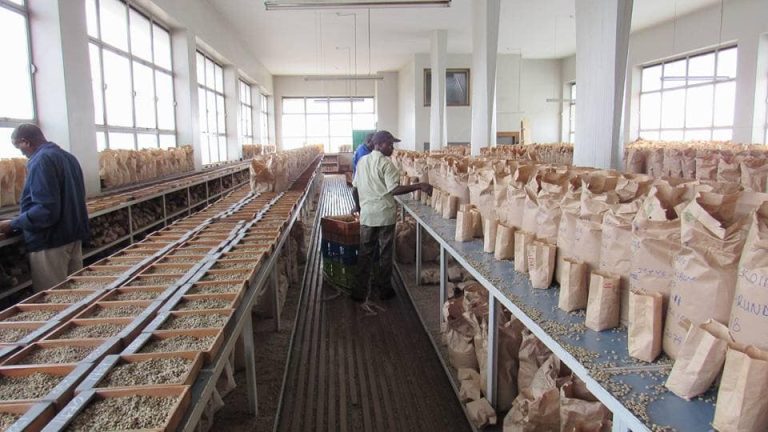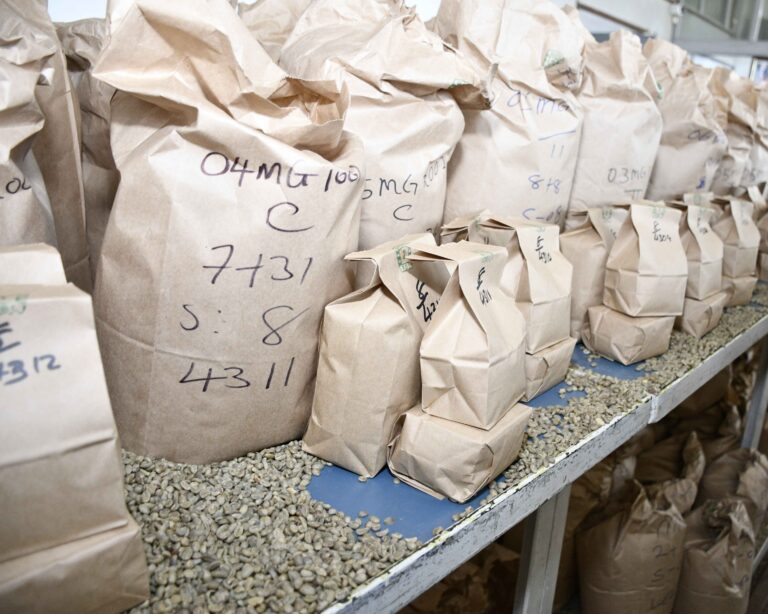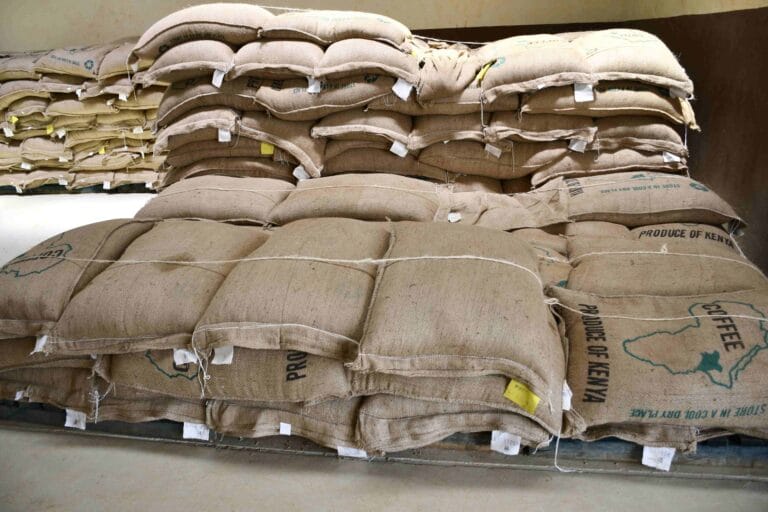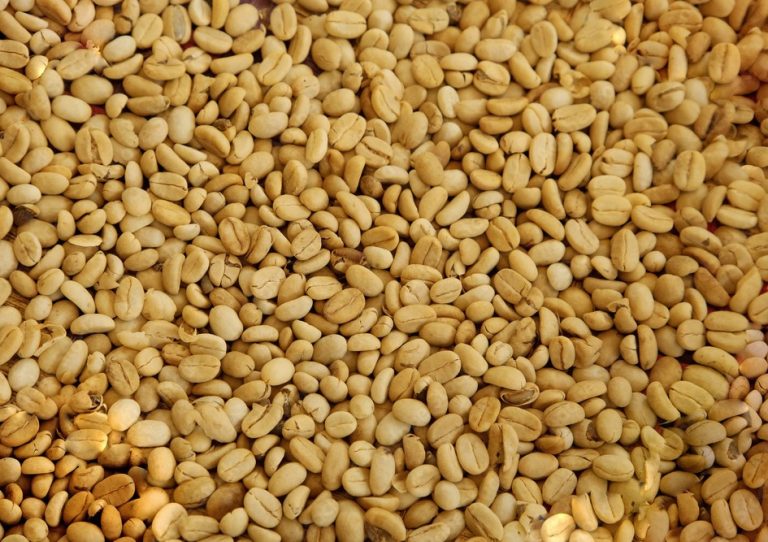By Henry Kinyua
Welcome to this weeks’ edition of the HK coffee market summary. This week the rains slowed down and coffee buyers and stakeholders had an easy time accessing the auction.
This week, Tuesday 28th November was the sale 7 of 2023/2024 Coffee year. But before we delve into the auction, I would like to again address the issue of Direct sales.
Several farmers specifically in estates have called me saying they are unable to conduct direct sales despite securing buyers outside the country who are interested and ready to pay for their coffee. They apparently had not been issued with a license to conduct direct sales. I therefore read through the regulations again and it is clear a grower does not need a license to sell their own coffee. Looking at the various sections of the regulations as indicated below, it is clear how a direct sale should be conducted.
For instance, the Coffee General Regulations 2019 in Section 24 Sub Section 4 states that “Direct sales shall be conducted according to the guidelines issued by the Authority in consultation with the county governments under the Sixth Schedule.”
The regulations further states that: (A licensed grower, or other legal entity representing growers shall notify the Authority and the respective county government of the direct sales and the notification shall include the following-
(a) a copy of the contract;
(b)) the coffee grade;
(c) the coffee quantity;
(d) the coffee price;
(c) details of a certification scheme, where applicable
(f) quality report;
(g) mode of payment; and
(h) a dispute resolution clause.
Let us read the other sub sections.
(5) The notification shall be deposited at the Authority for registration and facilitation with exportation documentation.
(6) A certificate of inspection shall be issued by the Authority on coffee to be sold under direct sales in the format prescribed under the Sixth Schedule.
Reading further the said SIXTH SCHEDULE, it states that,
Direct Sales Guidelines r 24(4)
A Grower or a grower miller who has secured an overseas Buyer for the coffee, shall:
- Store coffee for direct sales at designated warehouses.
- Enter into a direct sales contract in the format prescribed under these guidelines and shall lodge the contract with the Authority for registration and approval.
- Submit to the Authority a sample of 250gm of the said coffee for quality analysis and for arbitration purposes.
- Have the coffee inspected by the Authority, in order to ascertain the quality, quantity and the value and for approval of the contract.
- Be issued with an inspection certificate for every coffee consignment declared to the Authority for direct sales to ascertain the coffee quality. The inspection certificate shall be one of the requirements for clearance of direct sales exports.
- The Authority liquorer shall conduct quality analysis and assess the price offered, undertake price comparisons with the prices prevailing at the exchange for coffees of the same quality and grade and keep the growers accordingly informed.
- The direct sales price offered shall not be in any case lower than the exchange prevailing prices
- Ensure the overseas buyer remits full payment before shipment is undertaken.
- Apply to the Authority for, export clearance, ICO certificate; 498 Kenya Subsidiary Legislation, 2019, KEPHIS certification, Movement permits, Quality certificate and (1) Any other necessary clearance.
- Appoint an agent for purposes of logistics and other processing requirements related to coffee exports where applicable. Please note “where applicable”
- Remit monthly returns to the Authority on Direct sales undertaken. B. Direct Sales contract
So dear farmer, as long as you are a registered grower in your county and have secured a buyer outside the country follow the steps above and have your coffee sold. Prepare the relevant documents and notify the county government and the authority.
Back to Sale 7
In this sale 12,325 bags of coffee were traded at the auction. The value of coffee traded was $2,596,868 or Kshs. 390M. The number of brokers selling coffee at the auction were seven with New KPCU trading the highest volume at 43% followed by the new kid on the block Alliance berries at 20%, Kinya Coffee Marketing Agency at 13% and Kipkelion Broker Ltd at 10%.

The highest price paid for coffee was $279 per a 50kgs bag or $ 5.58 per Kg. This is equivalent to about Kshs 120 per kilo of cherry at pulping station factory gate.
Top grades AA and AB comprised 50% of the volume traded with the other balance taken by the lower grades.
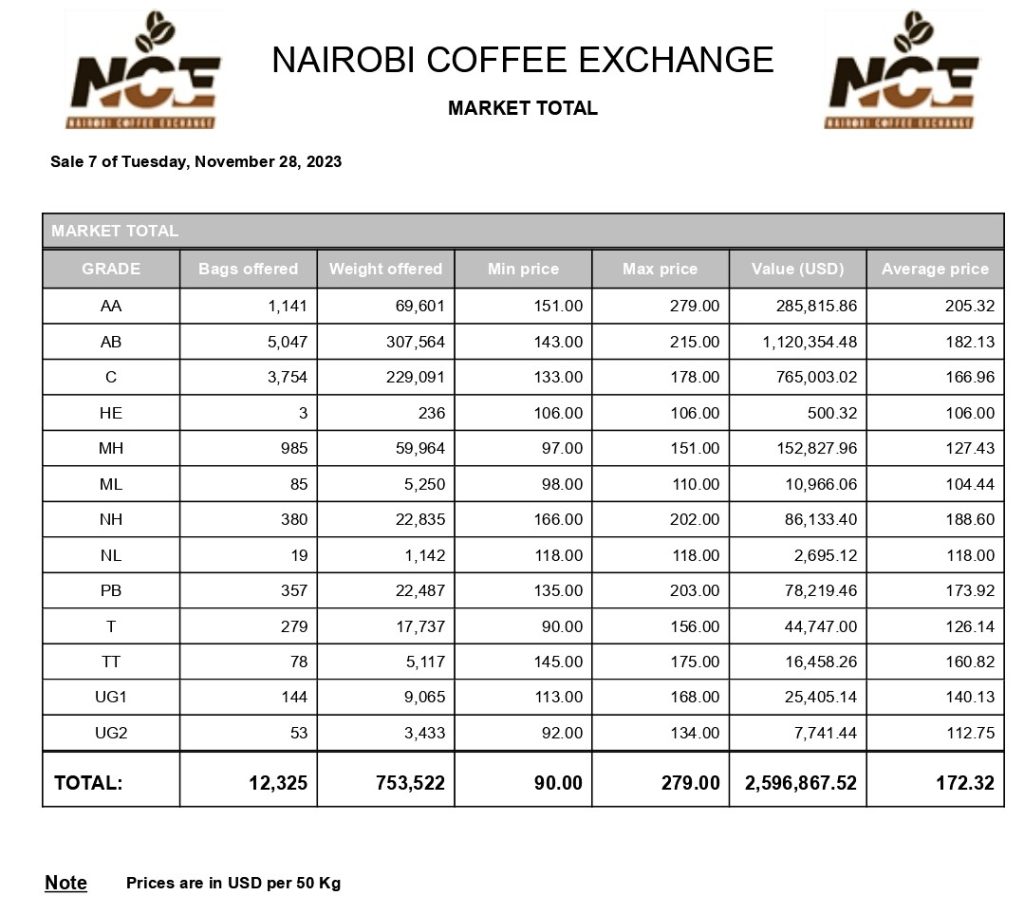
Someone had asked me whether coffee from growers or cooperatives that are Certified like with Rain Forest Alliance or other certification earn more at the auction. It took me back to the late 1990s and the early 2000s when I was working in the horticulture industry and certifications specifically Eurep Gap that later became GlobalGap were introduced.
What I learned then is that certifications do not guarantee you high prices but opens the door for you into the market that require them. In this sale 7, a total of 1309 bags or 11% of volumes traded were from certified growers.
Coffee Buyers
A Total of 15 buyers participated in the auction. The top 5 buyers led by Ibero at 28% bought 84% of the coffee traded. Others included Taylor Winch at 28% C.Dormans at 13%, Sasini at 10% and Louis Dreyfus taking the 5th position.

In the category of the least volume procured by a buyer we had Rosie Vam Dyke Company Ltd with 15 bags.
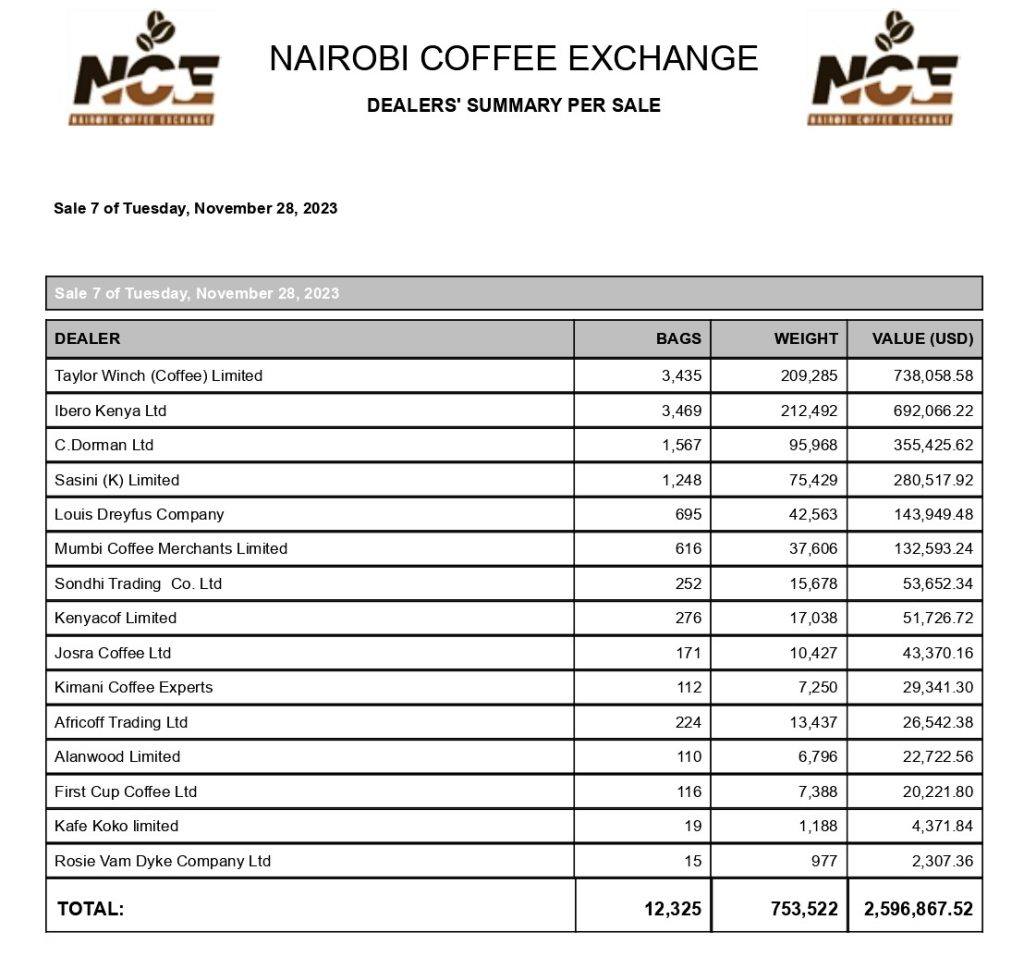
Status: Confirmed or Noted
The last column of the sales transaction listing released by NCE after every sale is “status” that indicates if the lot traded was confirmed or noted. Like in this sale 7, only 68 bags which is 0.55% of the volume traded were listed as confirmed.
To understand these terms, let us look at the process. Before going to the market, the broker together with the grower or the coffee owner states their reserve price. This is the minimum amount they are willing to take for their coffee and the figure is only known to the broker and grower. If the price offered for each lot traded meets or surpasses the reserve price, the broker confirms the sale as complete.
However, if the highest bidder falls short of the reserve price, the broker notes that price. The broker then has 24 hours to consult both the grower and the buyer (mostly the highest bidder) to negotiate. They might agree on a price different from what was offered and can confirm the sale. If they do not agree, then the coffee is removed from the market and can be presented in the subsequent markets. This high number of noted lots can mean that most growers are valuing their coffee higher than the buyers are or farmers are using the auction for price discovery and then engage the potential buyers outside the auction.
Download the Sale7 Transaction Listing below for detailed information



